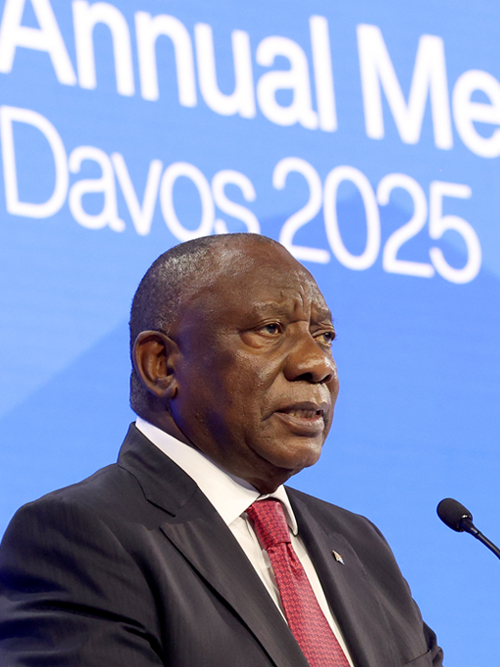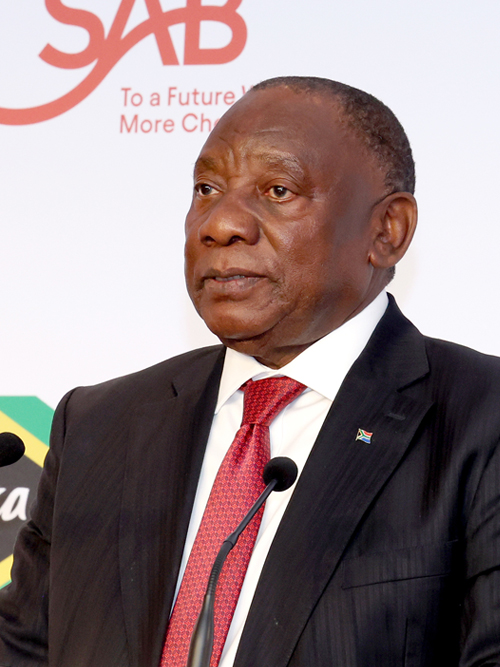Programme Director;
His Holiness Mahant Swami Maharaj;
Senior Government officials present here;
Fellow congregants;
Brothers and sisters;
Ladies and gentlemen;
Good evening,
It is a great honour and privilege to join, you this evening as we mark a momentous occasion; the opening of the Bochasanwasi Akshar Purushottam Swaminarayan Sanstha (BAPS) Multi-Cultural Centre and Temple, a beacon of faith, culture, and unity.
Previously, I had the opportunity to visit the centre during its initial development phase, and I am delighted to be a part of its inaugural celebration.
This event is more than just the inauguration of an architectural marvel. It is a powerful symbol of our shared commitment to building a South Africa rooted in diversity, inclusivity, and mutual respect.
This historic inauguration embodies our country's constitutional values; freedom of religion, human dignity, and unity in diversity which continue to drive our collective journey towards social cohesion and nation-building.
Your Holiness, Mahant Swami Maharaj, it is also with deep gratitude and reverence that we welcome you back to South Africa. Your participation here today reflects not only the BAPS community's global reach, but also the strong spiritual and cultural bonds that unite us.
I trust your stay since your arrival in our culturally and religiously diverse country has been enjoyable. You have come at a time when we have just celebrated 30 years of democracy in our country, under which freedom of religion has been guaranteed by Section 15 of the Constitution.
South Africa's culture is a vibrant tapestry woven from the threads of numerous ethnic groups, traditions, and influences. This rainbow nation's cultural identity reflects its history of diverse interactions, colonial legacies, and the resilience of its people.
Compatriots and friends,
As we gather here, we are reminded of the importance of embracing and celebrating our differences. In a world that is often divided by barriers and boundaries, this centre stands as a beacon of unity and understanding.
BAPS is well known for its commitment to humanitarian service, social upliftment, and cultural preservation. The Temple will serve not only as a place of worship, but as a sanctuary of peace, knowledge, and spiritual enrichment for people of all backgrounds.
This centre will serve as a place where people of all backgrounds can come together to learn from one another, to share their stories, and to celebrate their traditions. It should be a place of dialogue and collaboration, where we can build bridges of understanding and friendship.
I commend the thousands of volunteers who have worked tirelessly to bring this vision to life. We were encouraged by the spirit of volunteerism in the construction phase. It was an act of kindness and Ubuntu, which emphasise our interdependence: "I am, because you are."
The principles of dharma, seva (service), and unity that BAPS upholds indeed resonates deeply with our national ethos of Ubuntu—the belief in our shared humanity and interconnectedness.
There is a Xhosa language idiom in South Africa that says “Intaka yakha ngoboya benye”, translated as “A bird builds its nest with the feathers of another”, meaning that people need to help each other to achieve their goals, essentially signifying the importance of community, support and collaboration.
As a nation, we shall move forward with the same attitude of solidarity, compassion, respect and dignity towards our collective journey of a harmonious society.
Ladies and gentlemen,
As Government, we strive to build a more just and equal society, because we long recognised the indispensable role that faith-based organisations play in strengthening moral and ethical values in our society.
We are dedicated to fostering social cohesion, which involves embracing diversity and working towards a common understanding and a practical plan for positive social transformation.
Our history has taught us that diversity is not a weakness; it is our greatest strength. We know that unity does not mean uniformity. Instead, it means recognising and celebrating the different threads that make up the fabric of our society.
We are steadfast in our dedication to advancing the Bill of Rights, which serves as a cornerstone, protecting the rights of all individuals in our nation, and upholding the democratic principles of human dignity, equality, and freedom.
As we have gathered here today, we should reflect on the role that the Hindu community plays in nation-building. This community has a rich cultural heritage and values and has played a pivotal role in shaping the social fabric of our diverse society.
South Africa, a land of diverse cultures and traditions, has been enriched by the contributions of the Hindu community. Your teachings emphasise the values of unity, harmony, compassion, and respect for all beings. These principles have not only guided the lives of individuals but have also played a crucial role in fostering unity among communities irrespective of their backgrounds.
The teachings of love, tolerance, and understanding are inherent in the religion and promote mutual respect and understanding among different communities, fostering a sense of togetherness and unity.
Furthermore, the initiatives in the development of youth and community service activities have been instrumental in uplifting the less fortunate and marginalised sections of society.
Through various charitable endeavours, such as feeding the hungry, providing shelter to the homeless, and offering educational opportunities to underprivileged children, you have exemplified the values of compassion and service to humanity.
His Holiness, Mahant Swami Maharaj, since your last visit in 2019, South Africa, like the rest of the world, has faced numerous challenges. Yet, through resilience, compassion, and collective effort, we have emerged stronger as a nation.
On behalf of Government, we wish to invite the BAPS organisation to continue working with us in addressing the remaining challenges such as Gender-Based Violence and Femicide (GBVF), substance abuse, violence and crime facing our communities.
As a religious community, you have a crucial role to play in recognising and bolstering the best practices in your community for preventing and eliminating these ills. This is a responsibility that falls squarely on both our shoulders.
We must collaborate our efforts within our communities to reaffirm the importance of freedom, peace, and security, as well as respect for all human rights.
Compatriots,
Speaking of peace, I would like to join President Cyril Ramaphosa in conveying our deepest condolences to families of members of our South African National Defence Force (SANDF) who recently lost their lives in the Democratic Republic of Congo (DRC). These brave soldiers were dedicated to their mission and committed to contribute to peace and stability in the DRC.
We also call upon His Holiness to pray for peace and stability in the DRC and Africa as a whole.
In conclusion, let us draw inspiration from the Hindu values and principles, as we strive to build united and prosperous communities founded on mutual respect, understanding, love and cooperation.
Let me express my deepest appreciation to His Holiness Mahant Swami Maharaj, the BAPS community, and all those who have worked tirelessly to bring this vision to life. Let us all cherish and protect this Temple for future generations, because it serves as a symbol of hope, peace, and humanity.
I thank you.








